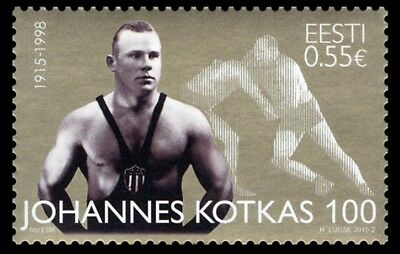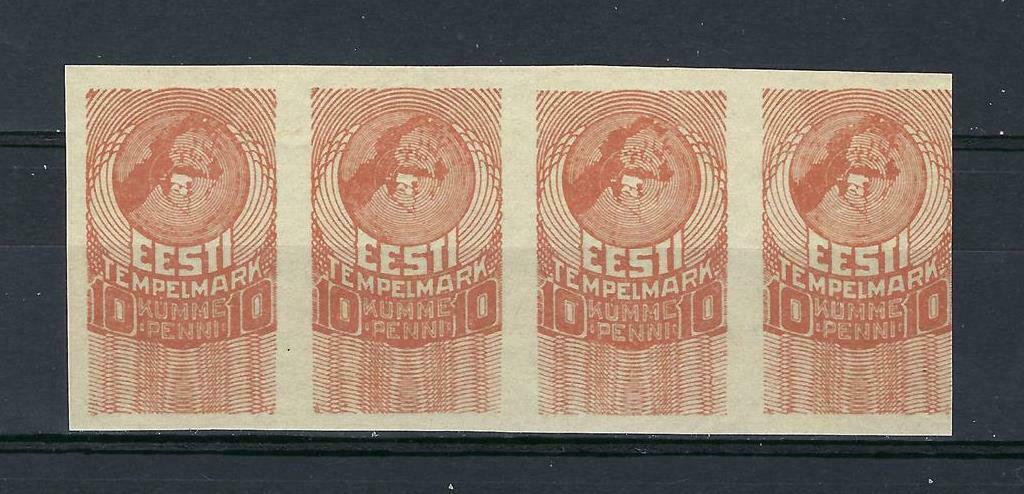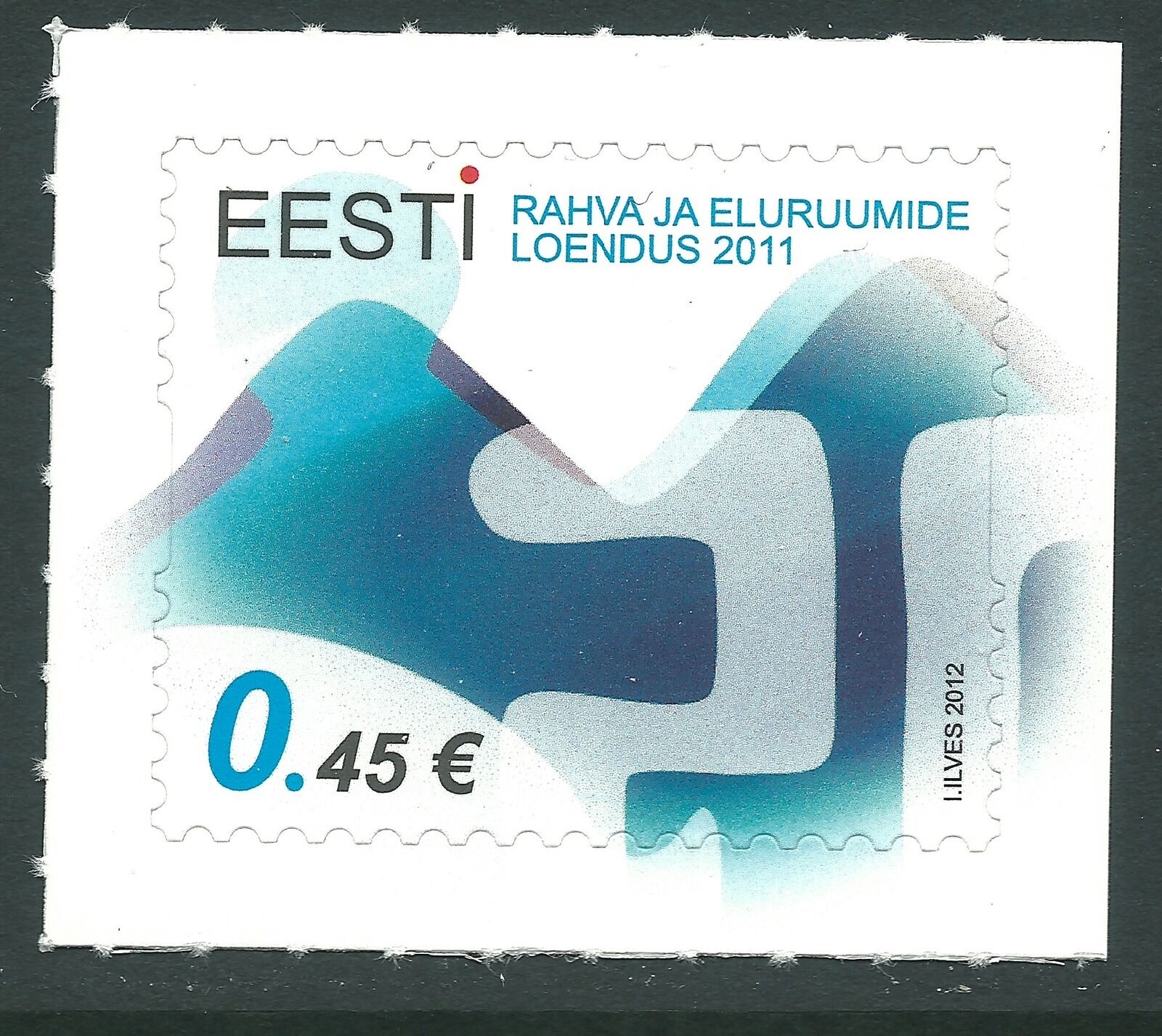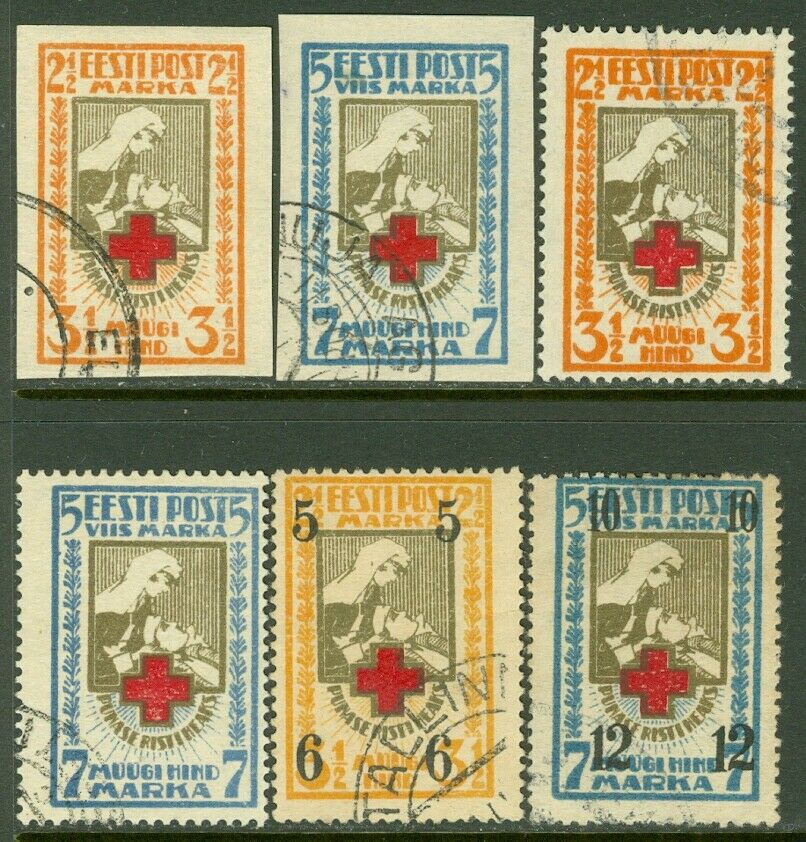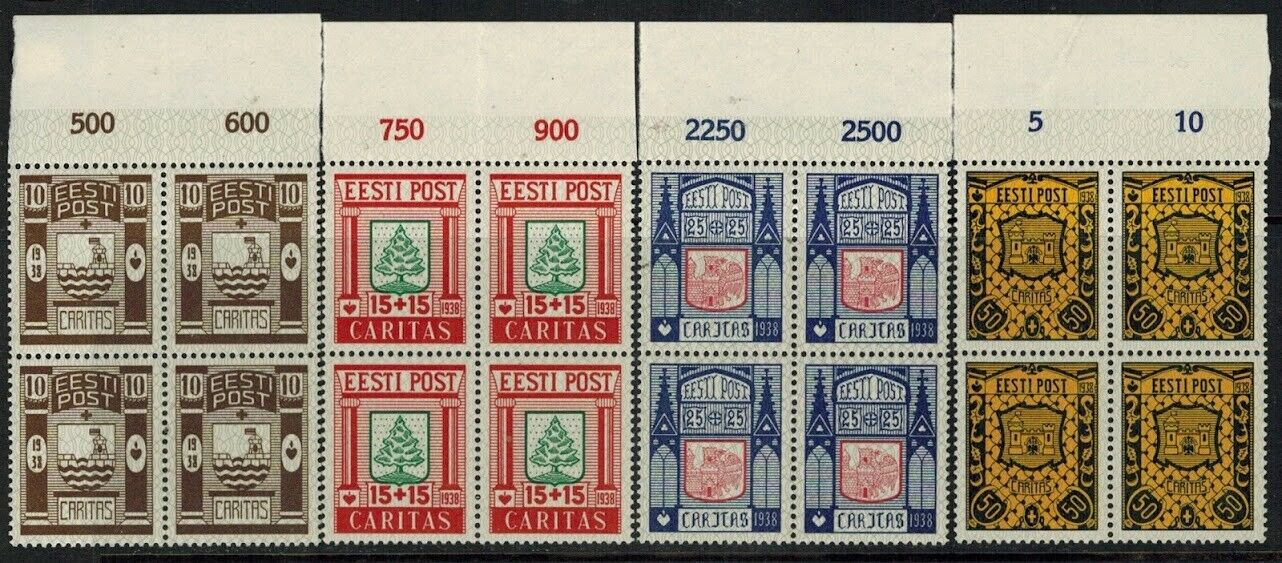-40%
Stamp of ESTONIA 2015 - Estonian wrestler Johannes Kotkas 100 590-03.02.15
$ 1.2
- Description
- Size Guide
Description
STAMP OF ESTONIA 2015 -Centenary of the birth of the wrestler Johannes Kotkas./
590-03.02.15
Johannes Kotkas (Feb 3, 1915 Tartumaa - May 8, 1998 Tallinn) is an Estonian wrestler and sports figure. Side by side with learning metalwork he joined wrestling and weightlifting fans and already the next year took part in the Estonian championships. In Estonian championships in 1937 he won the second place after the great example, Kristjan Palusalu, both in free-style and classical wrestling. In the 1938 European championships under the eyes of the home public he rose to become the best of the continent and next year he defended his title in Oslo. During the war Kotkas was mobilized to Russia, but was soon transferred from Archangel to Moscow where he could continue his trainings. Starting from 1940 he was member of Dynamo (later Põhjakotkas) and in 1943 rose to become Champion of the Soviet Union both in wrestling as well as in hammer throw. After the war Kotkas was appointed deputy chairman of the Estonian Sports Committee, but continued to train and compete. In 1947 he became European Champion for the third time in Prague. In the sports circles he rose to the peak of his career at the age of 37 and in the sports circles the Herculean sportsman was given the honourable name of Our Juhan. The peak moment for his career arrived to the 37-year old Herculean at the Helsinki Olympic Games where he defeated four opponents in a total of 13 minutes and 36 seconds and was crowned Olympic winner in Helsinki in 1952. Kotkas continued wrestling and achieved several more appreciable victories, such as a World Championships silver medal of and the World Cup trophy. In 1960 Kotkas gave up competitive sports but continued to function in the sports sphere, working as state senior coach and tutor of the young generation up to pension age. In 1989, when the activity of the Estonian Olympic Committee was revived, Kotkas was appointed an honorary member. He also received Service Badge of the International Wrestling Federation, and was bestowed the title of Honorary Citizen of Tallinn. Johannes Kotkas (Feb 3, 1915 Tartumaa - May 8, 1998 Tallinn) is an Estonian wrestler and sports figure. Side by side with learning metalwork he joined wrestling and weightlifting fans and already the next year took part in the Estonian championships. In Estonian championships in 1937 he won the second place after the great example, Kristjan Palusalu, both in free-style and classical wrestling. In the 1938 European championships under the eyes of the home public he rose to become the best of the continent and next year he defended his title in Oslo. During the war Kotkas was mobilized to Russia, but was soon transferred from Archangel to Moscow where he could continue his trainings. Starting from 1940 he was member of Dynamo (later Põhjakotkas) and in 1943 rose to become Champion of the Soviet Union both in wrestling as well as in hammer throw. After the war Kotkas was appointed deputy chairman of the Estonian Sports Committee, but continued to train and compete. In 1947 he became European Champion for the third time in Prague. In the sports circles he rose to the peak of his career at the age of 37 and in the sports circles the Herculean sportsman was given the honourable name of Our Juhan. The peak moment for his career arrived to the 37-year old Herculean at the Helsinki Olympic Games where he defeated four opponents in a total of 13 minutes and 36 seconds and was crowned Olympic winner in Helsinki in 1952. Kotkas continued wrestling and achieved several more appreciable victories, such as a World Championships silver medal of and the World Cup trophy. In 1960 Kotkas gave up competitive sports but continued to function in the sports sphere, working as state senior coach and tutor of the young generation up to pension age. In 1989, when the activity of the Estonian Olympic Committee was revived, Kotkas was appointed an honorary member. He also received Service Badge of the International Wrestling Federation, and was bestowed the title of Honorary Citizen of Tallinn. Johannes Kotkas (Feb 3, 1915 Tartumaa - May 8, 1998 Tallinn) is an Estonian wrestler and sports figure. Side by side with learning metalwork he joined wrestling and weightlifting fans and already the next year took part in the Estonian championships. In Estonian championships in 1937 he won the second place after the great example, Kristjan Palusalu, both in free-style and classical wrestling. In the 1938 European championships under the eyes of the home public he rose to become the best of the continent and next year he defended his title in Oslo. During the war Kotkas was mobilized to Russia, but was soon transferred from Archangel to Moscow where he could continue his trainings. Starting from 1940 he was member of Dynamo (later Põhjakotkas) and in 1943 rose to become Champion of the Soviet Union both in wrestling as well as in hammer throw. After the war Kotkas was appointed deputy chairman of the Estonian Sports Committee, but continued to train and compete. In 1947 he became European Champion for the third time in Prague. In the sports circles he rose to the peak of his career at the age of 37 and in the sports circles the Herculean sportsman was given the honourable name of Our Juhan. The peak moment for his career arrived to the 37-year old Herculean at the Helsinki Olympic Games where he defeated four opponents in a total of 13 minutes and 36 seconds and was crowned Olympic winner in Helsinki in 1952. Kotkas continued wrestling and achieved several more appreciable victories, such as a World Championships silver medal of and the World Cup trophy. In 1960 Kotkas gave up competitive sports but continued to function in the sports sphere, working as state senior coach and tutor of the young generation up to pension age. In 1989, when the activity of the Estonian Olympic Committee was revived, Kotkas was appointed an honorary member. He also received Service Badge of the International Wrestling Federation, and was bestowed the title of Honorary Citizen of Tallinn. Johannes Kotkas (Feb 3, 1915 Tartumaa - May 8, 1998 Tallinn) is an Estonian wrestler and sports figure. Side by side with learning metalwork he joined wrestling and weightlifting fans and already the next year took part in the Estonian championships. In Estonian championships in 1937 he won the second place after the great example, Kristjan Palusalu, both in free-style and classical wrestling. In the 1938 European championships under the eyes of the home public he rose to become the best of the continent and next year he defended his title in Oslo. During the war Kotkas was mobilized to Russia, but was soon transferred from Archangel to Moscow where he could continue his trainings. Starting from 1940 he was member of Dynamo (later Põhjakotkas) and in 1943 rose to become Champion of the Soviet Union both in wrestling as well as in hammer throw. After the war Kotkas was appointed deputy chairman of the Estonian Sports Committee, but continued to train and compete. In 1947 he became European Champion for the third time in Prague. In the sports circles he rose to the peak of his career at the age of 37 and in the sports circles the Herculean sportsman was given the honourable name of Our Juhan. The peak moment for his career arrived to the 37-year old Herculean at the Helsinki Olympic Games where he defeated four opponents in a total of 13 minutes and 36 seconds and was crowned Olympic winner in Helsinki in 1952. Kotkas continued wrestling and achieved several more appreciable victories, such as a World Championships silver medal of and the World Cup trophy. In 1960 Kotkas gave up competitive sports but continued to function in the sports sphere, working as state senior coach and tutor of the young generation up to pension age. In 1989, when the activity of the Estonian Olympic Committee was revived, Kotkas was appointed an honorary member. He also received Service Badge of the International Wrestling Federation, and was bestowed the title of Honorary Citizen of Tallinn. Johannes Kotkas (Feb 3, 1915 Tartumaa - May 8, 1998 Tallinn) is an Estonian wrestler and sports figure. Side by side with learning metalwork he joined wrestling and weightlifting fans and already the next year took part in the Estonian championships. In Estonian championships in 1937 he won the second place after the great example, Kristjan Palusalu, both in free-style and classical wrestling. In the 1938 European championships under the eyes of the home public he rose to become the best of the continent and next year he defended his title in Oslo. During the war Kotkas was mobilized to Russia, but was soon transferred from Archangel to Moscow where he could continue his trainings. Starting from 1940 he was member of Dynamo (later Põhjakotkas) and in 1943 rose to become Champion of the Soviet Union both in wrestling as well as in hammer throw. After the war Kotkas was appointed deputy chairman of the Estonian Sports Committee, but continued to train and compete. In 1947 he became European Champion for the third time in Prague. In the sports circles he rose to the peak of his career at the age of 37 and in the sports circles the Herculean sportsman was given the honourable name of Our Juhan. The peak moment for his career arrived to the 37-year old Herculean at the Helsinki Olympic Games where he defeated four opponents in a total of 13 minutes and 36 seconds and was crowned Olympic winner in Helsinki in 1952. Kotkas continued wrestling and achieved several more appreciable victories, such as a World Championships silver medal of and the World Cup trophy. In 1960 Kotkas gave up competitive sports but continued to function in the sports sphere, working as state senior coach and tutor of the young generation up to pension age. In 1989, when the activity of the Estonian Olympic Committee was revived, Kotkas was appointed an honorary member. He also received Service Badge of the International Wrestling Federation, and was bestowed the title of Honorary Citizen of Tallinn. Johannes Kotkas (Feb 3, 1915 Tartumaa - May 8, 1998 Tallinn) is an Estonian wrestler and sports figure. Side by side with learning metalwork he joined wrestling and weightlifting fans and already the next year took part in the Estonian championships. In Estonian championships in 1937 he won the second place after the great example, Kristjan Palusalu, both in free-style and classical wrestling. In the 1938 European championships under the eyes of the home public he rose to become the best of the continent and next year he defended his title in Oslo. During the war Kotkas was mobilized to Russia, but was soon transferred from Archangel to Moscow where he could continue his trainings. Starting from 1940 he was member of Dynamo (later Põhjakotkas) and in 1943 rose to become Champion of the Soviet Union both in wrestling as well as in hammer throw. After the war Kotkas was appointed deputy chairman of the Estonian Sports Committee, but continued to train and compete. In 1947 he became European Champion for the third time in Prague. In the sports circles he rose to the peak of his career at the age of 37 and in the sports circles the Herculean sportsman was given the honourable name of Our Juhan. The peak moment for his career arrived to the 37-year old Herculean at the Helsinki Olympic Games where he defeated four opponents in a total of 13 minutes and 36 seconds and was crowned Olympic winner in Helsinki in 1952. Kotkas continued wrestling and achieved several more appreciable victories, such as a World Championships silver medal of and the World Cup trophy. In 1960 Kotkas gave up competitive sports but continued to function in the sports sphere, working as state senior coach and tutor of the young generation up to pension age. In 1989, when the activity of the Estonian Olympic Committee was revived, Kotkas was appointed an honorary member. He also received Service Badge of the International Wrestling Federation, and was bestowed the title of Honorary Citizen of Tallinn. Johannes Kotkas (Feb 3, 1915 Tartumaa - May 8, 1998 Tallinn) is an Estonian wrestler and sports figure. Side by side with learning metalwork he joined wrestling and weightlifting fans and already the next year took part in the Estonian championships. In Estonian championships in 1937 he won the second place after the great example, Kristjan Palusalu, both in free-style and classical wrestling. In the 1938 European championships under the eyes of the home public he rose to become the best of the continent and next year he defended his title in Oslo. During the war Kotkas was mobilized to Russia, but was soon transferred from Archangel to Moscow where he could continue his trainings. Starting from 1940 he was member of Dynamo (later Põhjakotkas) and in 1943 rose to become Champion of the Soviet Union both in wrestling as well as in hammer throw. After the war Kotkas was appointed deputy chairman of the Estonian Sports Committee, but continued to train and compete. In 1947 he became European Champion for the third time in Prague. In the sports circles he rose to the peak of his career at the age of 37 and in the sports circles the Herculean sportsman was given the honourable name of Our Juhan. The peak moment for his career arrived to the 37-year old Herculean at the Helsinki Olympic Games where he defeated four opponents in a total of 13 minutes and 36 seconds and was crowned Olympic winner in Helsinki in 1952. Kotkas continued wrestling and achieved several more appreciable victories, such as a World Championships silver medal of and the World Cup trophy. In 1960 Kotkas gave up competitive sports but continued to function in the sports sphere, working as state senior coach and tutor of the young generation up to pension age. In 1989, when the activity of the Estonian Olympic Committee was revived, Kotkas was appointed an honorary member. He also received Service Badge of the International Wrestling Federation, and was bestowed the title of Honorary Citizen of Tallinn. Johannes Kotkas (Feb 3, 1915 Tartumaa - May 8, 1998 Tallinn) is an Estonian wrestler and sports figure. Side by side with learning metalwork he joined wrestling and weightlifting fans and already the next year took part in the Estonian championships. In Estonian championships in 1937 he won the second place after the great example, Kristjan Palusalu, both in free-style and classical wrestling. In the 1938 European championships under the eyes of the home public he rose to become the best of the continent and next year he defended his title in Oslo. During the war Kotkas was mobilized to Russia, but was soon transferred from Archangel to Moscow where he could continue his trainings. Starting from 1940 he was member of Dynamo (later Põhjakotkas) and in 1943 rose to become Champion of the Soviet Union both in wrestling as well as in hammer throw. After the war Kotkas was appointed deputy chairman of the Estonian Sports Committee, but continued to train and compete. In 1947 he became European Champion for the third time in Prague. In the sports circles he rose to the peak of his career at the age of 37 and in the sports circles the Herculean sportsman was given the honourable name of Our Juhan. The peak moment for his career arrived to the 37-year old Herculean at the Helsinki Olympic Games where he defeated four opponents in a total of 13 minutes and 36 seconds and was crowned Olympic winner in Helsinki in 1952. Kotkas continued wrestling and achieved several more appreciable victories, such as a World Championships silver medal of and the World Cup trophy. In 1960 Kotkas gave up competitive sports but continued to function in the sports sphere, working as state senior coach and tutor of the young generation up to pension age. In 1989, when the activity of the Estonian Olympic Committee was revived, Kotkas was appointed an honorary member. He also received Service Badge of the International Wrestling Federation, and was bestowed the title of Honorary Citizen of Tallinn. Johannes Kotkas (Feb 3, 1915 Tartumaa - May 8, 1998 Tallinn) is an Estonian wrestler and sports figure. Side by side with learning metalwork he joined wrestling and weightlifting fans and already the next year took part in the Estonian championships. In Estonian championships in 1937 he won the second place after the great example, Kristjan Palusalu, both in free-style and classical wrestling. In the 1938 European championships under the eyes of the home public he rose to become the best of the continent and next year he defended his title in Oslo. During the war Kotkas was mobilized to Russia, but was soon transferred from Archangel to Moscow where he could continue his trainings. Starting from 1940 he was member of Dynamo (later Põhjakotkas) and in 1943 rose to become Champion of the Soviet Union both in wrestling as well as in hammer throw. After the war Kotkas was appointed deputy chairman of the Estonian Sports Committee, but continued to train and compete. In 1947 he became European Champion for the third time in Prague. In the sports circles he rose to the peak of his career at the age of 37 and in the sports circles the Herculean sportsman was given the honourable name of Our Juhan. The peak moment for his career arrived to the 37-year old Herculean at the Helsinki Olympic Games where he defeated four opponents in a total of 13 minutes and 36 seconds and was crowned Olympic winner in Helsinki in 1952. Kotkas continued wrestling and achieved several more appreciable victories, such as a World Championships silver medal of and the World Cup trophy. In 1960 Kotkas gave up competitive sports but continued to function in the sports sphere, working as state senior coach and tutor of the young generation up to pension age. In 1989, when the activity of the Estonian Olympic Committee was revived, Kotkas was appointed an honorary member. He also received Service Badge of the International Wrestling Federation, and was bestowed the title of Honorary Citizen of Tallinn. Johannes Kotkas (Feb 3, 1915 Tartumaa - May 8, 1998 Tallinn) is an Estonian wrestler and sports figure. Side by side with learning metalwork he joined wrestling and weightlifting fans and already the next year took part in the Estonian championships. In Estonian championships in 1937 he won the second place after the great example, Kristjan Palusalu, both in free-style and classical wrestling. In the 1938 European championships under the eyes of the home public he rose to become the best of the continent and next year he defended his title in Oslo. During the war Kotkas was mobilized to Russia, but was soon transferred from Archangel to Moscow where he could continue his trainings. Starting from 1940 he was member of Dynamo (later Põhjakotkas) and in 1943 rose to become Champion of the Soviet Union both in wrestling as well as in hammer throw. After the war Kotkas was appointed deputy chairman of the Estonian Sports Committee, but continued to train and compete. In 1947 he became European Champion for the third time in Prague. In the sports circles he rose to the peak of his career at the age of 37 and in the sports circles the Herculean sportsman was given the honourable name of Our Juhan. The peak moment for his career arrived to the 37-year old Herculean at the Helsinki Olympic Games where he defeated four opponents in a total of 13 minutes and 36 seconds and was crowned Olympic winner in Helsinki in 1952. Kotkas continued wrestling and achieved several more appreciable victories, such as a World Championships silver medal of and the World Cup trophy. In 1960 Kotkas gave up competitive sports but continued to function in the sports sphere, working as state senior coach and tutor of the young generation up to pension age. In 1989, when the activity of the Estonian Olympic Committee was revived, Kotkas was appointed an honorary member. He also received Service Badge of the International Wrestling Federation, and was bestowed the title of Honorary Citizen of Tallinn.
Shipping and handling:
International regular mail - 2.95$ Registered mail is 7.90$
Combined shipping available -
NO extra charge for additional stamps/ FDCs
.
Payment: PayPal
.
!
! ATTENTION !! Buyers from RUSSIA and BELARUS. I will ship ONLY by registered mail – 6.50$.
B
нимание
покупатели из России
и Беларусь -
Отправка
Ваш
ег
о
заказ
а только
заказным письмом - 6.50$
